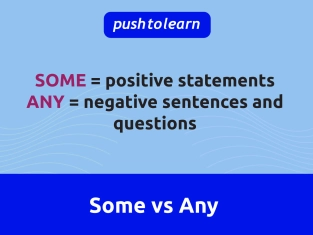by PushtoLearn
Countable and Uncountable Nouns
Table of Contents
Countable and Uncountable Nouns Exercises
These exercises focus on Countable and Uncountable Nouns
What Are Countable and Uncountable Nouns?
Countable nouns are things we can count. They have a singular and a plural form. For example:
-
Singular: apple, car, book
-
Plural: apples, cars, books
Uncountable nouns are things we cannot count. They often refer to substances, ideas, or qualities. For example:
-
water, information, happiness

Rules for Countable and Uncountable Nouns
Here are the key rules to remember:
|
Countable Nouns |
Uncountable Nouns |
|
Can be singular or plural. |
Have only one form (no plural). |
|
Use a/an before singular nouns. |
Don’t use a/an with uncountable nouns. |
|
Use numbers: two apples, five cars. |
Cannot use numbers directly: five waters (incorrect). |
|
Can use many: many books, many cats. |
Use much: much sugar, much time. |
|
Combine with few: a few oranges. |
Combine with little: a little milk. |
Uncountable Nouns by Category
1. Substances and Materials
-
Water
-
Milk
-
Coffee
-
Tea
-
Oil
-
Rice
-
Sugar
-
Salt
-
Bread
-
Flour
-
Butter
-
Gold
-
Silver
-
Glass
-
Wood
2. Abstract Concepts
-
Advice
-
Information
-
Knowledge
-
News
-
Love
-
Happiness
-
Anger
-
Education
-
Freedom
-
Beauty
-
Honesty
-
Hope
-
Peace
-
Patience
3. Weather and Natural Phenomena
-
Rain
-
Snow
-
Hail
-
Fog
-
Thunder
-
Lightning
-
Sunshine
-
Wind
4. Fields of Study and Activities
-
Art
-
Music
-
Literature
-
Science
-
History
-
Research
-
Work
-
Homework
-
Travel
5. Food and Drinks (as substances)
-
Cheese
-
Meat
-
Fruit
-
Fish
-
Pasta
-
Soup
-
Water
-
Soda
-
Alcohol
6. Collective or General Terms
-
Furniture
-
Equipment
-
Luggage
-
Baggage
-
Clothing
-
Jewelry
-
Machinery
-
Traffic
Tip: Quantify Uncountable Nouns
Use specific words to measure or count these nouns:
-
A piece of advice
-
A bottle of water
-
A loaf of bread
-
A cup of tea
-
A slice of cheese
Examples in Everyday Use
Countable Nouns
-
I have two pens in my bag.
-
She bought an orange from the market.
-
There are many chairs in the room.
Uncountable Nouns
-
We need more rice to cook dinner.
-
He gave me some good advice.
-
I don’t have much money left.
Common Errors and How to Fix Them
|
Mistake |
Why It’s Wrong |
Correct Sentence |
|
I need a water. |
"Water" is uncountable; no a or an. |
I need some water. |
|
She has many informations. |
"Information" is uncountable; no plural. |
She has much information. |
|
There is a few milk in the fridge. |
"Milk" is uncountable; use "a little." |
There is a little milk in the fridge. |
|
Can you give me an advice? |
"Advice" is uncountable; no a or an. |
Can you give me some advice? |
|
I ate two breads for breakfast. |
"Bread" is uncountable; use "slices of bread." |
I ate two slices of bread for breakfast. |
Everyday Tips
-
Use quantifiers for uncountable nouns: Words like some, a little, much, a lot make uncountable nouns easier to use.
-
Example: "I need some sugar," not "I need sugar."
-
Practice with real-life objects: Look around your room and classify objects as countable or uncountable. For example, chair is countable, but furniture is uncountable.
-
Learn phrases for uncountable nouns: Use specific words to quantify them, such as:
-
a piece of advice
-
a cup of tea
-
a loaf of bread
-
Ask questions in practice: Try asking questions with these nouns to test your understanding:
-
How many apples do we need?
-
How much water should I bring?
See also Irregular Plural Nouns
FAQ
How do I know if a noun is countable or uncountable?
Check if the noun has a plural form or if you can count it directly. If not, it’s likely uncountable.
Can some nouns be both countable and uncountable?
Yes, some nouns can be both, depending on their meaning:
-
Glass (material - uncountable; drinking container - countable).
-
Example: "The window is made of glass" vs. "I need a glass of water."
Can I use "some" with both types of nouns?
Yes! Use "some" for plural countable nouns and uncountable nouns:
-
Countable: Some apples
-
Uncountable: Some juice
What are common uncountable nouns?
Words like water, air, love, music, information, furniture are uncountable.
What should I use for uncountable nouns instead of "many"?
Use words like much, some, a lot of, or quantifying phrases like a bit of or a piece of.

